How to Reduce the Cost of Healthcare Benefits with Wellness Programs
Last Updated Jul 3, 2025

Healthcare costs keep climbing — but your benefits budget doesn’t have to.
When premiums spike and claims pile up, the pressure to rein things in lands squarely on HR’s shoulders. Cutting care isn’t the answer.
But cutting costs is possible, and thousands of HR leaders are already doing it with one powerful strategy: wellness programs that actually work: 91% of HR leaders say their wellness program reduces their healthcare costs (up from 78% in 2023).
The secret? Smart, flexible design that meets employee needs and protects the bottom line. No bloated budgets. No overpriced perks. Just proven, preventative support that keeps your people healthier and your spending in check.
Ready to turn wellness into a cost-saving machine? Discover how to build a lean, effective program that drives down claims, wins leadership buy-in, and boosts engagement without overspending.
What You'll Learn
- Wellness Programs Can Cut Healthcare Costs Without Cutting Care: Strategic, preventative wellness initiatives — like stipends, HRAs, and LSAs — empower employees while driving down claims. Over 90% of HR leaders report healthcare savings from such programs.
- Leadership Buy-In Hinges on Clear ROI Data: Objections about cost, participation, or business impact can be countered with strong data: wellness programs improve productivity, reduce turnover, and yield financial returns of over $2 for every $1 spent.
- Personalized and Flexible Offerings Drive Engagement: Surveying employees, tailoring benefits by demographic, and offering flexible access to fitness, mental health, and nutrition tools significantly boost participation and satisfaction across the workforce.
- Digital Tools and Strategic Partnerships Multiply Impact: Affordable, tech-based solutions (like fitness apps and wellness platforms) enhance engagement and scalability. Partnerships with insurers or platforms like Wellhub further amplify reach and cost-effectiveness.
- A Culture of Wellness Delivers Long-Term ROI: Embedding wellness into daily routines, DEI efforts, and manager training builds a sustainable wellness culture. Aligning programs with legal compliance ensures protection for both employees and the organization.
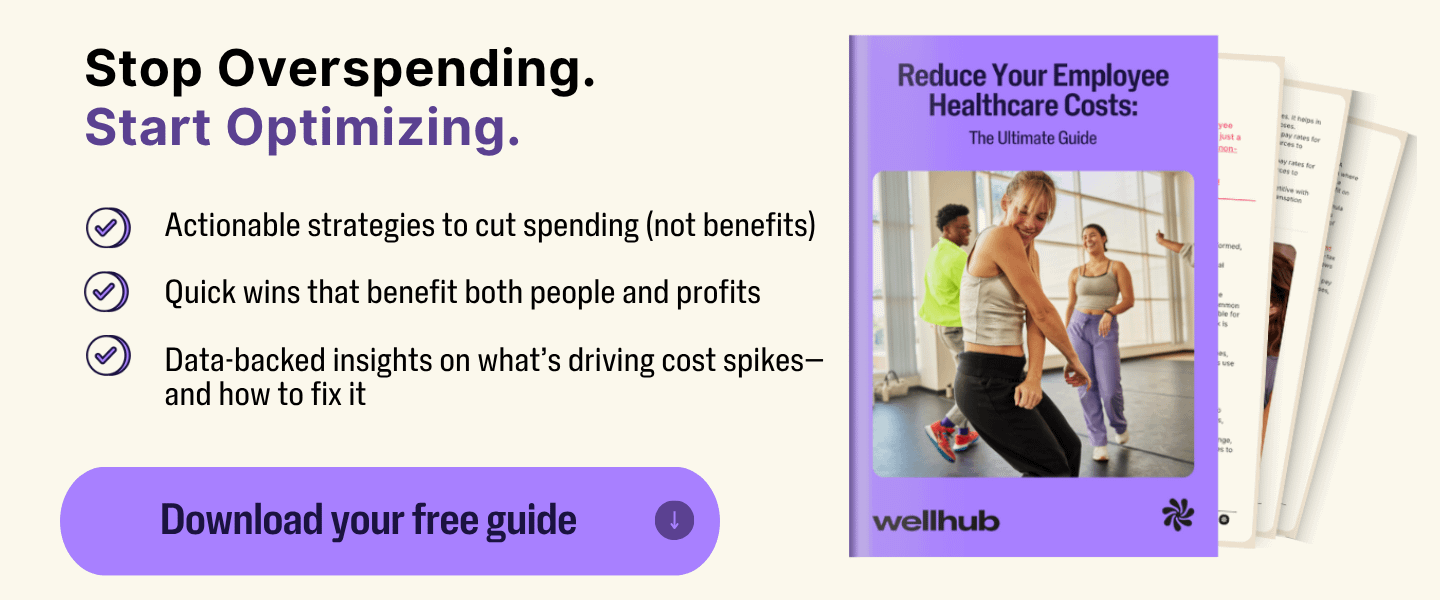
Step 1: Design for Cost-Efficiency from the Start
Wellness programs don’t have to be big-ticket initiatives to make a big impact. In fact, some of the most effective cost-saving strategies start with something surprisingly simple: giving employees more choice.
By designing your wellness program with flexibility and financial control in mind, you can support employee health and reduce healthcare spend — all without overspending on underutilized benefits.
Start with a Wellness Stipend
A wellness stipend puts the power in your employees’ hands. Instead of committing to one-size-fits-all offerings, you allocate a monthly or quarterly stipend employees can use on what supports their wellbeing most — fitness classes, meditation apps, meal kits, or even sleep tracking tools. This flexibility makes it easier for employees to engage, which can reduce stress-related claims and increase long-term ROI.
Incorporate Health Reimbursement Arrangements (HRAs)
HRAs are a tax-efficient way to support employee health needs without the overhead of a traditional plan. With an HRA, employers reimburse employees for qualified medical expenses — like doctor visits, prescriptions, or therapy — up to a defined limit. This structure gives your team autonomy while reducing plan overutilization and helping you forecast costs more accurately.
Offer Lifestyle Spending Accounts (LSAs)
Where HRAs typically cover medical expenses, LSAs are designed to fund broader wellbeing initiatives like therapy, coaching, gym memberships, or nutrition programs. These preventive investments can help employees stay healthier over time — which lowers the likelihood of expensive interventions down the road.
Bring it All Together With Smart Data
No matter which tools you choose, it’s essential to connect them to employee insights. Platforms like Wellhub help you track what employees are using and what’s making a difference so you can maximize program usage.
Designing for cost-efficiency isn’t about offering less. It’s about offering smarter — supporting your people in the ways that matter most, while staying in control of the financials.
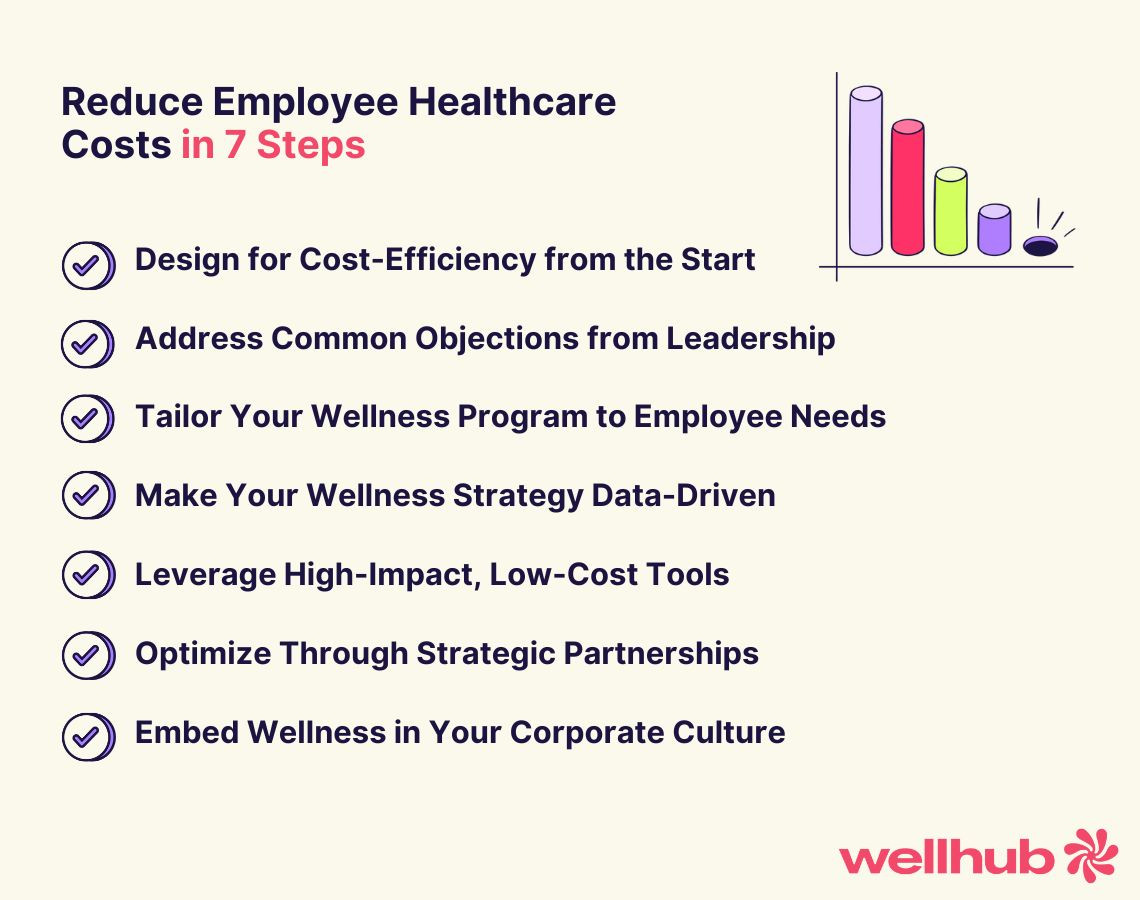
Step 2: Address Common Objections from Leadership
HR leaders know wellness programs drive value. But that doesn’t mean it’s easy to secure executive buy-in. Concerns about cost, utilization, and business impact still show up in budget meetings. That’s why it’s critical to come armed with data that answers each objection directly.
Objection: “Wellness Programs are Too Expensive.”
In reality, the return of wellness programs usually exceeds the initial cost. In fact, 56% of companies see a return over 100%, meaning they get more than $2 back for every $1 invested. These returns come from lower healthcare claims, reduced absenteeism, and stronger retention.
Objection: “Employees Don’t Use These Programs.”
The issue isn’t employee disinterest — it’s access. When a wellness program is offered, 79% of employees use it. That’s a strong participation rate, especially when programs offer personalized options employees actually want to engage with.
Objection: “It’s a Drag on the Bottom Line.”
In reality, wellness programs are directly tied to better business outcomes. HR leaders report:
- 98% say wellness programs reduce turnover
- 99% say they increase productivity
- 89% say they reduce sick days
These aren't soft metrics — they’re critical drivers of cost control and performance.
Objection: “Wellness Programs Just Increase Employee Health Spending.”
Some leaders worry adding another line item to employee wellness spending just means more spending. But the data shows just the opposite.
- 91% of companies say their wellness program reduces healthcare costs.
The reality is that preventive care and proactive support reduce the need for high-cost interventions. When employees sleep better, move more, and manage stress effectively, the impact shows up in your claims data in all the right ways.
💡Pro Tip: Consider creating a short, one-page wellness ROI summary you can bring to finance conversations. (Need help pulling one together? Let’s talk.)
At the end of the day, wellness programs aren’t a cost center — they’re a cost solution. And with the right design and the right data, leadership will see them for what they are: one of the most strategic investments a company can make.
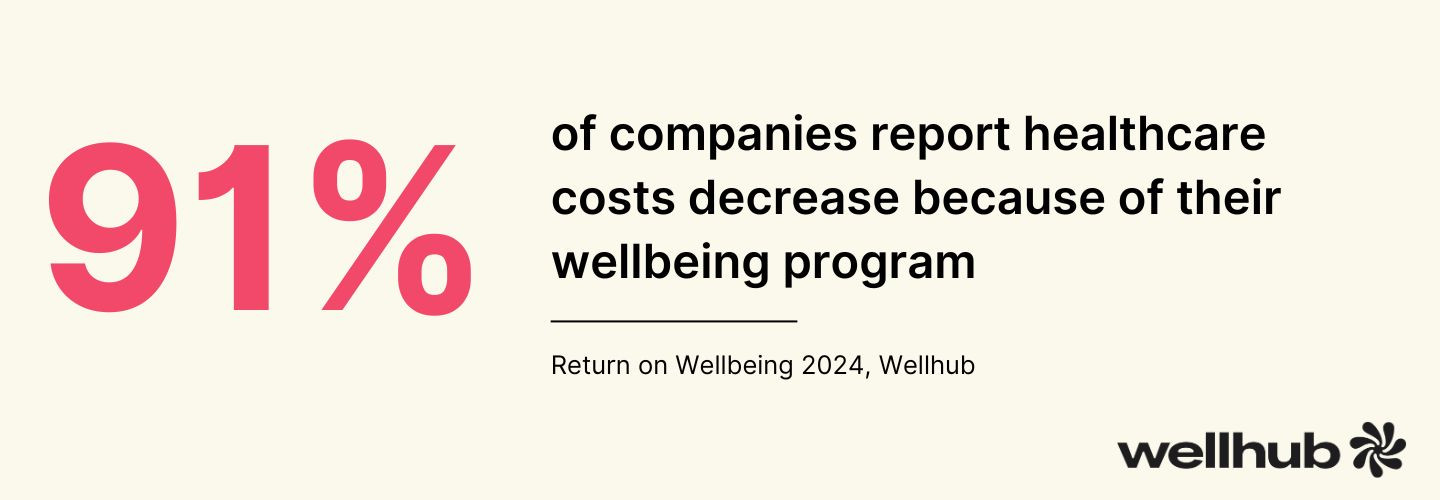
Step 3: Tailor Your Wellness Program to Employee Needs
The best way to drive engagement is to make the program feel personal. That means building your strategy around what your employees actually need, not just what’s trending.
Start With a Survey
It’s easy to guess what your team wants, but it’s smarter to ask. Use employee surveys, focus groups, or pulse checks to understand what wellbeing challenges people are facing and which benefits they’d actually use. Whether it's stress management, fitness options, or better sleep support, employees are much more likely to engage with a program they had a hand in shaping.
Personalize Offerings Across Demographics
Not all employees will benefit from the same tools. Younger workers are more likely to use meditation apps, digital fitness platforms, and therapy. Meanwhile, older employees may prioritize ergonomic support, chronic condition management, or preventive health screenings. Offering a menu of options — rather than a single solution — helps ensure every employee finds value in your program.
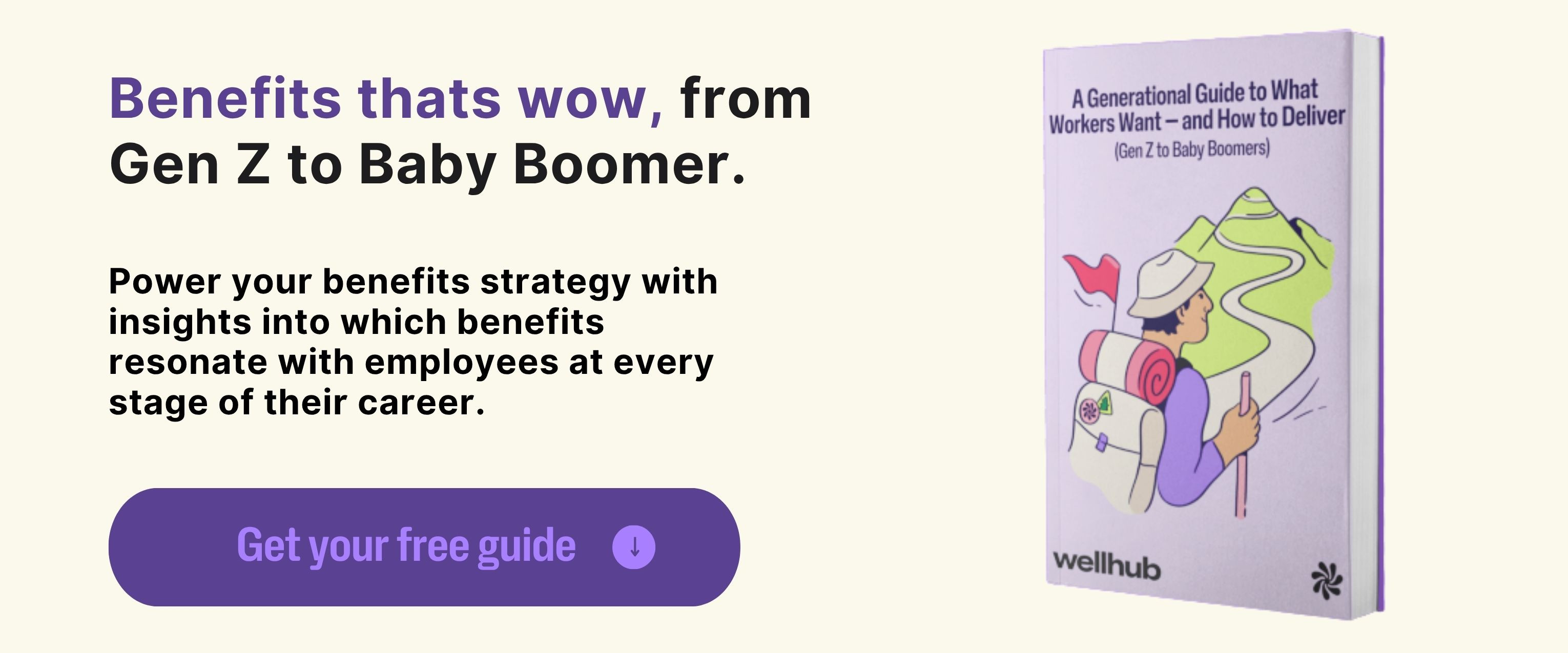
Flexibility Drives Satisfaction
Different people define and pursue wellness in different ways. Some people want to work out at 6 a.m. Others prefer an evening meditation. Some want in-person gym access, while others need digital tools because they’re remote, traveling, or caregiving. A flexible wellness program that includes movement, nutrition, mental wellness lets employees engage when, where, and how it works for them — which dramatically increases participation.
When employees feel like their wellbeing is being taken seriously, it shows up in how they feel about their workplace. Just 12% of employees say their company offers a wellness program. But among those who do,61% are happy at work — compared to just 36% of employees without access to wellness support. That’s a major gap in morale tied directly to program availability and perceived value.
Step 4: Make Your Wellness Strategy Data-Driven
Wellness programs are a strategic investment. And like any investment, they should be tracked, measured, and optimized over time. When you treat your wellness program like any other business initiative, you gain the insights needed to improve outcomes and justify your spend.
Start with Meaningful Metrics
The key to measuring success is tracking the right things. Go beyond attendance numbers at a yoga class and focus on indicators that actually reflect health outcomes and cost savings. These might include:
- Employee participation and engagement rates
- Uptake of preventive care services
- Reductions in sick days or unplanned absences
- Increased use of mental wellness resources
These are the leading indicators that tell you your program is moving in the right direction — and they’re often easier to track than you might think.
Benchmark your Healthcare Spend
One of the clearest ways to demonstrate ROI is to compare healthcare spending before and after launching your wellness program. Look for shifts in:
- Insurance claim volumes
- High-cost care related to cardiac, musculoskeletal, or diabetic conditions
- Prescription drug usage, especially for chronic conditions tied to stress or inactivity
This is where the financial argument gets real. If claims are going down — or leveling off while premiums rise nationwide — your wellness program is likely playing a role.
Use Claims Data Effectively
You don’t need personal health information to evaluate results. Partner with your insurance broker or provider to access anonymized, de-identified claims data. This type of reporting can help you spot trends, flag costly gaps in care, and refine your offerings based on real employee needs.
And the payoff? When HR leaders track the ROI of their wellness programs,95% report seeing a positive return — up from 90% the year before. That’s a clear sign that the organizations paying attention are the ones seeing the benefits.
A data-driven approach transforms wellness from a feel-good initiative into a cost-saving strategy. When you measure what matters, you can prove what works — and make better decisions moving forward.
Step 5: Leverage High-Impact, Low-Cost Tools
You don’t need a big budget to build a meaningful wellness program. Some of the most effective solutions are also the most affordable, especially when you embrace digital tools. These options are accessible, easy to scale, and proven to boost engagement without inflating your spend.
Make Wellness Tech Foundational
Digital wellness tools — from meditation apps to fitness trackers — give employees flexible, self-directed support they can use on their terms. These tools meet people where they are, whether they’re looking for stress relief at midnight or a lunch-hour workout. Emotional health app usage recently jumped 74%, a clear signal that employees want and need this kind of support.
Boost Experience with Gamification
Gamification is a powerful way to make healthy habits stick, according to research from the Center for Health Incentives and Behavioral Economics. Wellness challenges, like hydration competitions or team-based step goals, build community while supporting behavior change. They also make wellness fun — and when employees enjoy engaging with your program, they’re more likely to return to it again and again.
Offer On-demand Access
One of the biggest barriers to wellness is time: 56% of employees say time constraints keep them from exercising more often. That’s why round-the-clock access to support — like therapy apps, virtual fitness classes, or mindfulness resources — is so important. Employees can engage when it works for them, which reduces the likelihood of burnout, stress-related absenteeism, or preventable medical care.
The best tools remove friction.That helps you increase engagement, improve outcomes, and keep your program cost-effective.

Step 6: Optimize Through Strategic Partnerships
Building and maintaining a wellness program doesn’t mean doing everything yourself. In fact, one of the smartest things you can do is bring in the right partners: vendors who expand your reach, fill in expertise gaps, and help you deliver more value without more overhead.
Start by Partnering with your Healthcare Provider
If your wellness program is helping reduce costly claims, your provider should know about it — and reward you for it. Many insurers offer premium discounts or financial incentives for employers who meet specific engagement benchmarks, such as preventive care utilization or participation in wellness screenings.
Even if discounts aren’t immediately available, bringing your program data to the table can open the door to cost-saving negotiations. When your provider sees that you're proactively supporting employee health, they're more likely to see you as a lower-risk group.
Select a Scalable Wellness Partner
The most efficient way to offer a broad, inclusive wellness program is to partner with a platform that already has the infrastructure in place. Wellhub, for example, connects employees to thousands of in-person and digital wellness options — from gyms and fitness classes to meditation apps and nutrition support — all in one platform.
And the results are significant:
- 74% of employees with Wellhub say their overall wellbeing improved (vs. 43% of employees without Wellhub)
- 55% of employees with Wellhub report getting quality sleep wellbeing (vs. to 26% of employees without Wellhub)
- 73% of employees with Wellhub say their physical wellbeing improved over the last year (vs. 41% of employees without Wellhub)
A partner like Wellhub doesn’t just take the heavy lifting off your plate — it gives your program immediate breadth, flexibility, and credibility. It’s a way to launch a comprehensive wellness solution quickly, without having to build it from the ground up.
Strategic partnerships make it possible to do more with less so you can scale your program in a way that’s sustainable. When you align with vendors who share your goals and bring their own expertise to the table, your wellness program becomes stronger, smarter, and far more effective.
Step 7: Embed Wellness in Your Corporate Culture
A successful wellness program goes beyond benefits administration. It becomes part of how your organization works day in and day out. When wellness is woven into company culture, it stops being a line item and starts being a strategic differentiator.
Normalize Wellness in Everyday Routines
Start small. Encourage walking meetings, build in mindfulness breaks, or set aside quiet hours for focused work. These small adjustments reinforce the idea that wellbeing matters — not just as a perk, but as a core part of the employee experience. The more you normalize healthy behaviors, the more likely employees are to engage with them.
Equip managers to Lead with Care
Managers are often the first to spot early signs of burnout — but only if they know what to look for. Manager training should include tools for recognizing stress, supporting flexibility, and starting conversations around wellbeing. Empowering your people leaders to model and support wellness sets the tone for the rest of the organization.
Make Wellness Part of your DEI Strategy
An effective wellness program is inclusive by design. That means considering access across different roles, locations, schedules, and identities. Offer multilingual resources. Ensure benefits support different cultural needs. Provide options for people with mobility or caregiving challenges. When wellness is equitable, it becomes far more impactful — and far more engaging.
Recognize Wellbeing in Performance Conversations
If you want wellness to stick, you need to value it. Incorporate wellbeing goals into employee development conversations. Acknowledge managers who foster balanced teams. Reward behaviors that support a healthy work environment, like setting clear boundaries or using PTO.
Embedding wellness into your culture isn’t about overhauling your operations. It’s about reinforcing, at every level, that people matter. When you do that consistently — through rituals, policies, leadership, and reviews — your wellness program stops being a program. It becomes part of how your company works. And that’s where lasting change begins.
Regulatory Considerations
If you’re offering a wellness program—or thinking about starting one—compliance is key.
Done right, wellness initiatives can reduce healthcare costs and boost employee engagement. But to unlock those benefits and stay legally sound, you need to follow a few critical guidelines.
Here’s what HR leaders should know before rolling out any employee wellness program.
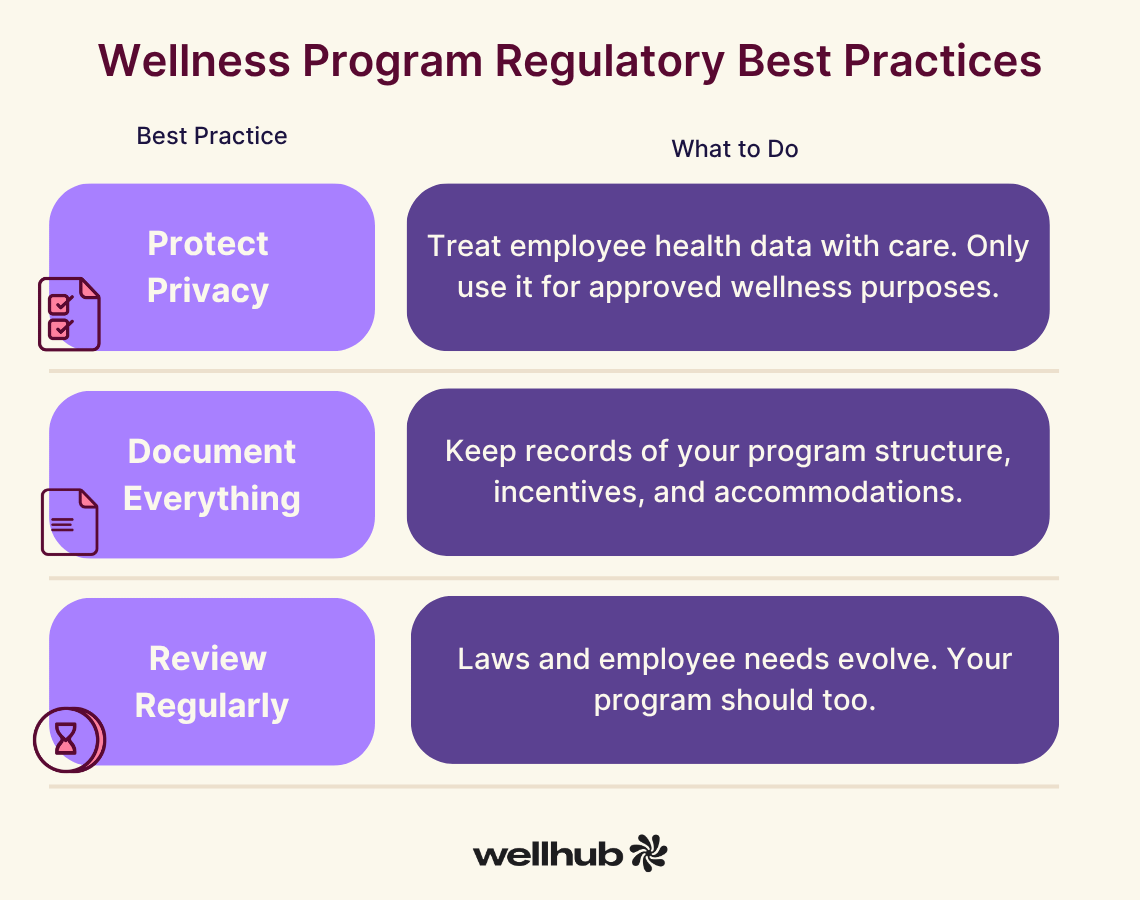
Types of Wellness Programs
Wellness programs fall into two main categories under federal law:
- Participatory Programs: These are programs anyone can join, regardless of their health status. Think: attending a nutrition workshop or filling out a health risk assessment.
- Health-Contingent Programs: These require employees to meet a specific health outcome to earn a reward, like quitting smoking or lowering blood pressure. Because these programs tie incentives to health, they come with more rules to protect employees' rights.
Key ACA and HIPAA Requirements for Health-Contingent Programs
Health-contingent wellness programs that offer incentives must meet five specific criteria under the Affordable Care Act (ACA) and the Health Insurance Portability and Accountability Act (HIPAA):
- Annual Opportunity: Employees must have a chance to qualify for the incentive at least once per year.
- Incentive Limits: Incentives must not exceed 30% of the total cost of employee-only coverage (50% for tobacco-related programs).
- Reasonable Design: Programs must aim to improve health or prevent disease—and that goal must be achievable by the average person.
- Alternative Standards: You must provide an alternative way to qualify (or waive the standard entirely) if someone can’t meet the health target due to a medical condition.
- Clear Disclosure: All program materials must explain how to request an alternative standard or waiver.
ADA, GINA, and IRS Rules to Keep in Mind
Other laws shape how you collect health information and handle rewards:
- ADA (Americans with Disabilities Act): Limits what medical information you can request. It also requires you to keep that data confidential.
- GINA (Genetic Information Nondiscrimination Act): Prohibits asking for genetic details—like family medical history—when offering incentives.
- IRS Rules: Some incentives, like cash or gift cards, may be taxable. Make sure you factor that into your program planning.
Wellness programs are powerful when built with both empathy and compliance in mind. When you strike that balance, your company can help employees thrive and reduce organizational risk.
Cut Claims, Not Care
Rising claims and stubborn premiums can derail even the best benefits strategy. Leaders want results, and HR needs solutions that fit tight budgets.
That’s where employee wellbeing programs shine. A thoughtful strategy boosts participation, helps people stay healthy, and lowers long-term costs. Nearly 75% of HR leaders say these programs reduce the cost of providing healthcare — and 90% of companies that track ROI see a positive return.
Speak with a Wellhub Wellbeing Specialist to launch a program that saves money and strengthens your team.

Company healthcare costs drop by up to 35% with Wellhub*
See how we can help you reduce your healthcare spending.
[*] Based on proprietary research comparing healthcare costs of active Wellhub users to non-users.
References:
- Health Insurance Portability and Accountability Act of 1996. (1996, August 20). ASPE. https://aspe.hhs.gov/reports/health-insurance-portability-accountability-act-1996
- Patient Protection and Affordable Care Act, Pub. L. No. 111-148, 124 Stat. 119 (2010).
https://housedocs.house.gov/energycommerce/ppacacon.pdf - UPenn Center for Health Incentives and Behavioral Economics. (2023, September 26). StudyFiNds: ‘Gamification’ A bona fide way to exercising regularly, Study Finds - Center for Health Incentives and Behavioral Economics (CHIBE). Center for Health Incentives and Behavioral Economics (CHIBE). https://chibe.upenn.edu/news/studyfinds-gamification-a-bona-fide-way-to-exercising-regularly-study-finds/
- Wellhub (2024, May 16). Return on Wellbeing 2024. https://wellhub.com/en-us/resources/research/return-on-wellbeing-2024/
- Wellhub (2024, October 16). The State of Work-Life Wellness 2025. https://wellhub.com/en-us/resources/research/work-life-wellness-report-2025/
- Wellhub. (2024, December 9). Wellhub Year in Motion 2023. https://wellhub.com/en-us/blog/press-releases/gympass-year-in-motion-2023/
Category
Share

The Wellhub Editorial Team empowers HR leaders to support worker wellbeing. Our original research, trend analyses, and helpful how-tos provide the tools they need to improve workforce wellness in today's fast-shifting professional landscape.
Subscribe
Our weekly newsletter is your source of education and inspiration to help you create a corporate wellness program that actually matters.
Subscribe
Our weekly newsletter is your source of education and inspiration to help you create a corporate wellness program that actually matters.
You May Also Like

Reducing Healthcare Cost: 9 Tips for Employers
Start reducing employee healthcare costs with these actionable strategies.

Beyond the Basics: Variable vs. Fixed Costs | Wellhub
Master the art of cost classification and optimize business expenses. Explore variable vs. fixed costs and discover Wellhub solutions for financial fitness.

Cost Management: A Quick Guide to What It Is and Why It’s Important
Cost management isn’t just for finance teams. Here’s a guide to cost management for HR leaders and professionals.